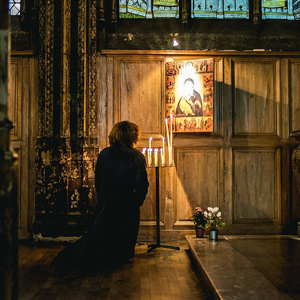
As christians we believe that we are made for eternal life, and our being is an “embodied” spiritual reality. Death therefore is not an obliteration of our reality, but a temporary separation from our corporeal reality, our corruptible body. The invisible, incorporeal reality, i.e., our soul, will then experience an encounter with God, where we come to see all the decisions we made in life, and come to realize in full what direction we have chosen during our lifetime on earth. Those who have chosen against the promptings for good and mercy will get what they chose: hatred and destruction, what we call hell; those who have chosen good and mercy will experience healing and bliss.
But since God is perfect, and scriptures tell us only the perfectly good can stand being in the presence of the Good Himself, not all can initially experience bliss and blessedness as they tend toward God presence. Those who are not yet perfect therefore, when placed in the presence of God, will need to go through healing and purgation: we Catholics call that “purgatory”. It is a process, and everyone going in will end up in heaven for they will have been purified.
But there are those, who during their lifetime, have taken a path of intentionally tending toward more and more giving and loving and merciful. They readily sacrificed themselves to set free and better others, and they have not given up becoming a better person despite their own flaws and often sinfulness. These in effect have lived their purgation during their lifetime on earth. These souls would go directly to heaven.
Saints, in general, are all the souls who are now currently in heaven, alive before God enjoying eternal happiness. They include both those who entered directly to heaven after a virtuous life, and those who entered after a time in purgatory. Saints are therefore holy and fully alive. They see God face to face directly, and can take in as much of God as their created being allows. They are therefore more fully aware of God’s Will and pleasure, and through God’s all-knowing, more aware of our needs. In fact, they love God so completely, and because God loves us so completely, they also love us more than we love ourselves. And their desire for us to be holy, which is to be totally set free from sin and hatred and selfishness and embrace our identity of God’s children is so ardent, that they long to see us to enter heaven and be with them celebrating the fullness of life. They therefore would do anything to implore God to assist us on our way to salvation.
If we only knew how blazing their desire is to assist us, we would be hastening our way toward God!
P.S. There are also “canonized” saints, which the Church recognized after a process of rigorous examination, as persons known to be in heaven. These are proven because of miracles attributed to their intercession after their death. But canonized saints are certainly not the only persons in heaven now. There are many more holy persons that the world does not know: like holy mothers who quietly sacrificed themselves in the daily caring of their children and family, selfless teachers and doctors everywhere, simple joyful souls who tirelessly pray for others, servant hearts who give of themselves readily in a hidden way, etc. And of course, those not so perfect ones who did enter heaven after purgation. The Church canonizes saints so to provide us with good lived examples that holiness is possible, and to give us particular names to implore for interceding for our particular needs.


